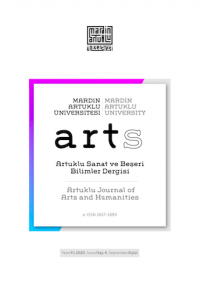Alternative Methods in Innovative Jewelry Design with CAD-CAM: Polymeric Metarial and Laser Sintering
Öz
In the jewelry sector, production has been made using many technologies and techniques since ancient times. The main purpose here is that the production of a jewelry is in line with the criteria of mass production, speed, aesthetics, light weight and marketable. In addition to these, hand-made jewelery, as well as designs from different materials are produced with computer-aided production methods. Thanks to CAD, designs drawn in various computer programs can be produced with different materials in three dimensions by the CAM method. Thanks to this production technique, designs drawn on the computer can be obtained with different materials. These products provide variety according to the type of material and production technique. For many years, in the jewelery industry, products were produced with three-dimensional printers using wax, resins etc. and then sent to the casting. In recent years, different production methods have been developed thanks to the technology developed with 3D printers. Some of these methods will be examined in this study. These are three-dimensional production techniques with laser metal sintering and SLS from polymeric material (polyamide). Thanks to the production of jewelry and objects made with different materials, it is possible to design products freely. In this study; The advantages and disadvantages of sintering, polyamide and sls, which are produced with computer-aided manufacturing methods, will be discussed and information will be given about alternative contributions and reflections to jewelry design in the jewelry industry.
Kaynakça
- In the jewelry sector, production has been made using many technologies and techniques since ancient times. The main purpose here is that the production of a jewelry is in line with the criteria of mass production, speed, aesthetics, light weight and marketable. In addition to these, hand-made jewelery, as well as designs from different materials are produced with computer-aided production methods. Thanks to CAD, designs drawn in various computer programs can be produced with different materials in three dimensions by the CAM method. Thanks to this production technique, designs drawn on the computer can be obtained with different materials. These products provide variety according to the type of material and production technique. For many years, in the jewelery industry, products were produced with three-dimensional printers using wax, resins etc. and then sent to the casting. In recent years, different production methods have been developed thanks to the technology developed with 3D printers. Some of these methods will be examined in this study. These are three-dimensional production techniques with laser metal sintering and SLS from polymeric material (polyamide). Thanks to the production of jewelry and objects made with different materials, it is possible to design products freely. In this study; The advantages and disadvantages of sintering, polyamide and sls, which are produced with computer-aided manufacturing methods, will be discussed and information will be given about alternative contributions and reflections to jewelry design in the jewelry industry.
CAD-CAM ile İnovatif Takı Tasarımlarında Alternatif Yöntemler: Polimerik Malzeme ve Lazer Sinterleme
Öz
Kuyumculuk sektöründe ilkçağlardan itibaren birçok teknoloji ve teknik kullanılarak üretim yapılmıştır. Burada esas amaç bir takının üretiminde seri üretim, hız, estetik, hafif ve pazarlanabilme kriterlerine uygun olmasıdır. Bununla birlikte geleneksel yöntemlerle elle üretilen takıların yanı sıra bilgisayar destekli üretim yöntemleriyle farklı malzemelerden tasarımlar da üretilmektedir. CAD sayesinde çeşitli bilgisayar programlarında çizilen tasarımlar, CAM yöntemiyle üç boyutlu olarak farklı malzemelerle üretilebilmektedir. Bu üretim tekniği sayesinde, bilgisayarda çizilen tasarımlar farklı malzemelerle ürün olarak elde edilebilmektedir. Bu elde edilen ürünler malzemenin ve üretim tekniğinin cinsine göre çeşitlilik sağlamaktadır. Uzun yıllardır mücevher sektöründe üç boyutlu yazıcılarla mum, reçine v.b. malzemelerle ürünler üretilip ardından döküme gönderilerek üretim yapılmaktaydı. Son yıllarda ise yine üç boyutlu yazıcılarla gelişen teknoloji sayesinde farklı üretim metotları geliştirilmiştir. Bu metotlardan bazıları bu çalışmada incelenecektir. Bunlar, lazerle metal sinterleme, sls teknolojisi ile polimerik malzemeden (polyamid) üç boyutlu üretim tekniğidir. Farklı malzemelerle yapılan mücevher, takı ve obje üretimi sayesinde, tasarımlarda özgürce ürün tasarlamaya imkân sağlanmaktadır. Bu çalışmada; bilgisayar destekli üretim yöntemlerinden sinterleme, polyamid ve sls ile üretim yapılan takıların diğer üretim yöntemlerine göre avantajları, dezavantajları tartışılıp kuyumculuk sektöründe mücevher tasarımına alternatif katkıları ve yansımaları hakkında bilgiler verilip örnekler sunulacaktır.
Anahtar Kelimeler
Kaynakça
- In the jewelry sector, production has been made using many technologies and techniques since ancient times. The main purpose here is that the production of a jewelry is in line with the criteria of mass production, speed, aesthetics, light weight and marketable. In addition to these, hand-made jewelery, as well as designs from different materials are produced with computer-aided production methods. Thanks to CAD, designs drawn in various computer programs can be produced with different materials in three dimensions by the CAM method. Thanks to this production technique, designs drawn on the computer can be obtained with different materials. These products provide variety according to the type of material and production technique. For many years, in the jewelery industry, products were produced with three-dimensional printers using wax, resins etc. and then sent to the casting. In recent years, different production methods have been developed thanks to the technology developed with 3D printers. Some of these methods will be examined in this study. These are three-dimensional production techniques with laser metal sintering and SLS from polymeric material (polyamide). Thanks to the production of jewelry and objects made with different materials, it is possible to design products freely. In this study; The advantages and disadvantages of sintering, polyamide and sls, which are produced with computer-aided manufacturing methods, will be discussed and information will be given about alternative contributions and reflections to jewelry design in the jewelry industry.
Ayrıntılar
| Birincil Dil | Türkçe |
|---|---|
| Bölüm | Araştırma Makalesi |
| Yazarlar | |
| Yayımlanma Tarihi | 15 Eylül 2020 |
| Yayımlandığı Sayı | Yıl 2020 Sayı: 4 |
ARTS, CC BY-NC 4.0 ile lisanslanmaktadır
YAYINCI | DERGİ KURULLARI | DİZİNLER | ÜCRET POLİTİKASI | İSTATİSTİKLER | MIAR | SHERPA ROMEO

